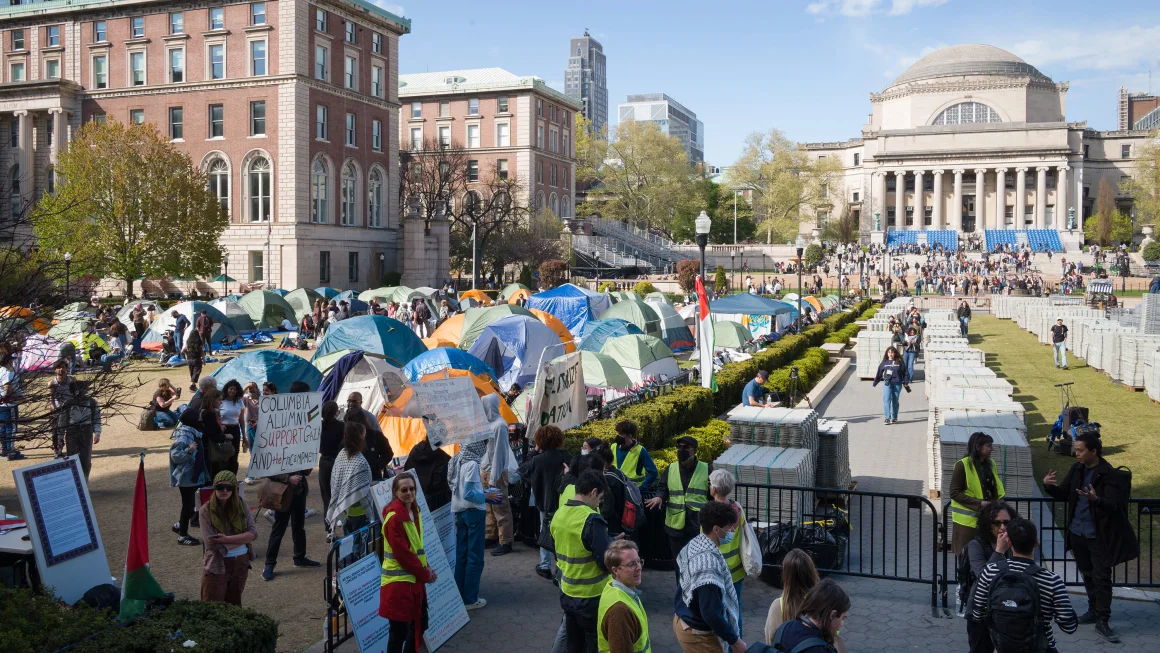The Trump administration’s attempt this month to deport a Columbia University graduate and pro-Palestinian campus activist due to his alleged “activities aligned to Hamas” was the first case of its kind to grab headlines.
Since then, two foreign-born academics with visas to work at other prominent US universities – Georgetown and Brown – have been detained or deported over homeland security concerns.
Another Columbia student and Fulbright scholar left the country after she was told she faced immigration action as part of President Donald Trump’s crackdown on international students who participated in protests against the Israel-Hamas war, which flared again this week as a ceasefire that Trump’s envoy had been working to extend fell apart.
“This is the first arrest of many to come,” Trump posted March 10 about Columbia graduate Mahmoud Khalil’s case. “We know there are more students at Columbia and other Universities across the Country who have engaged in pro-terrorist, anti-Semitic, anti-American activity, and the Trump Administration will not tolerate it.”
Trump’s Department of Education also is investigating 60 universities – including six of eight in the Ivy League – for “antisemitic harassment and discrimination.”
The administration’s effort to delegitimize the role of universities is not a new idea. It follows decades of private and public talk among conservatives about weakening the institutions.
And the pressure now focused on higher education in particular has a familiar ring to Steven Levitsky, a professor of government and Latin American studies at Harvard University and a coauthor of “How Democracies Die.”
“It is really common for authoritarian governments – both those on the left and those on the right – to go after universities,” said Levitsky. “It’s difficult to find an autocrat from Hugo Chávez (in Venezuela) to Viktor Orbán (in Hungary) to (Recep Tayyip) Erdoğan in Turkey that has not sought to attack, weaken and essentially control universities.”
The faculty and students facing immigration actions
Mahmoud Khalil is a prominent Palestinian activist who played a central role last year in campus protests at Columbia against the Israel-Hamas war. A legal permanent US resident and spouse of a US citizen, he was arrested by immigration officers in early March outside his apartment on Columbia’s New York campus.
The Trump administration has accused the Syrian-born Palestinian refugee – without providing evidence – of being a terrorist sympathizer, supporting Hamas and promoting the organization on campus, which Khalil denies. White House officials have also said Khalil distributed flyers promoting Hamas, a claim his lawyers deny.
Khalil’s attorneys argue the Trump administration targeted him for his pro-Gaza views and participating in demonstrations in support of Palestinians, violating his First and Fifth Amendment protections.
He remains detained at an Immigration and Customs Enforcement facility in Louisiana after a judge this week ordered his case transferred to New Jersey from New York.
Dr. Rasha Alawieh is a kidney transplant physician and a teacher at Brown in Rhode Island. She was detained for more than a day last week at Boston Logan International Airport upon her return from a visit to her native Lebanon.
Federal agents found photos of former Hezbollah leader Hassan Nasrallah and Iran’s supreme leader that had been deleted in a folder on Alawieh’s cell phone, a source familiar with the case told CNN. “Dr. Alawieh stated that she did not want to give authorities the perception that she supports Hezbollah and the Ayatollah politically or militarily,” a court filing obtained by CNN affiliate WCVB reads.
Alawieh, 34, acknowledged to federal agents she had attended Nasrallah’s funeral – a public event attended by thousands – during her visit in Beirut and told them Hezbollah is a terrorist organization, according to the source. The group is a designated terror organization in the US and many other Western countries.
“I think if you listen to one of his sermons, you would know what I mean,” Alawieh allegedly told the agents, according to WCVB’s copy of the filing. “He is a religious, spiritual person. As I said, he has very high value. His teachings are about spirituality and morality.”
“Our client is in Lebanon, and we’re not going to stop fighting to get her back in the US to see her patients, and we’re also going to make sure that the government follows the rule of law,” an attorney representing Alawieh’s family in a federal complaint fighting the deportation, Stephanie Marzouk, told reporters in mid-March outside a Boston courthouse.
Badar Khan Suri, a postdoctoral fellow and an Indian citizen doing “research on peace building in Iraq and Afghanistan,” faces expulsion from the US, Georgetown University in Washington, DC, announced this week.
Khan Suri was detained by the Department of Homeland Security, which accuses him of “actively spreading Hamas propaganda and promoting antisemitism on social media,” an agency spokesperson said on X, adding: “Khan Suri has close connections to a known or suspected terrorist, who is a senior advisor to Hamas.”
“[Khan] Suri’s activities and presence in the United State[s] rendered him deportable” under the statute that empowers the top UP diplomat to act if he believes a non-citizen could have “serious adverse foreign policy consequences for the United States,” the spokesperson said.
Khan Suri is innocent, his lawyer Hassan Ahmad said.
A federal judge on Thursday ruled the Trump administration could not deport Khan Suri. US District Judge Patricia Tolliver Giles said that while she reviews his petition, the administration is not to remove him from the country unless she issues another ruling to the contrary, according to the order.
“We are not aware of him engaging in any illegal activity and we have not received a reason for his detention,” the university’s Interim President Robert Groves told its Board of Directors in a letter obtained by CNN.
Khan Suri’s family has not been given any information about his detention, his sister, Khushnuma Khan, told CNN. That includes their parents who live in the north Indian state of Uttar Pradesh.
“We are currently confused about how and why this is happening to him,” she said.
“If an accomplished scholar who focuses on conflict resolution is whom the government decides is bad for foreign policy,” Ahmad said, “then perhaps the problem is with the government, not the scholar.”







